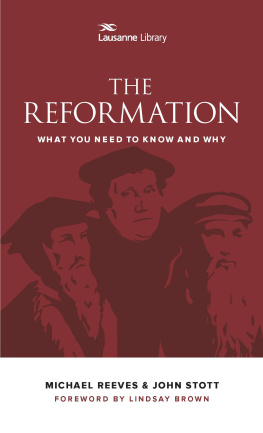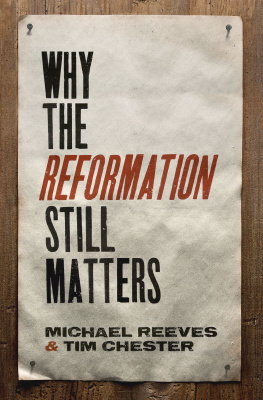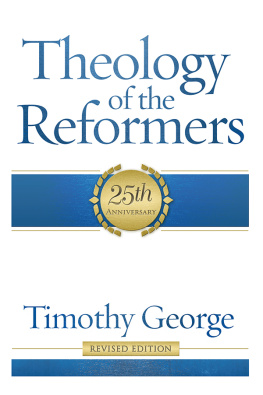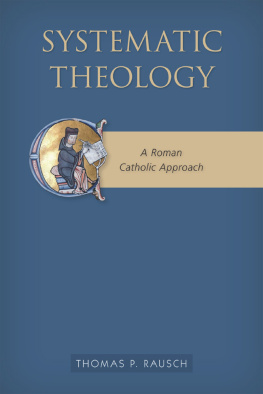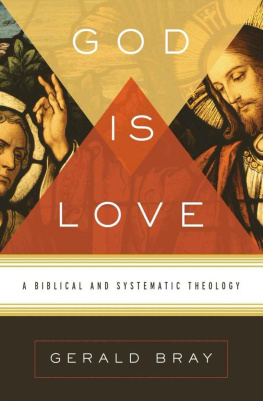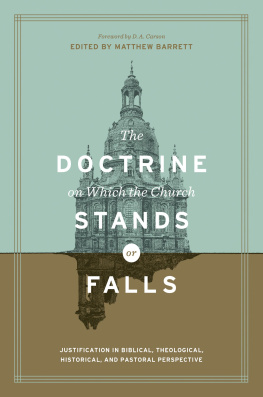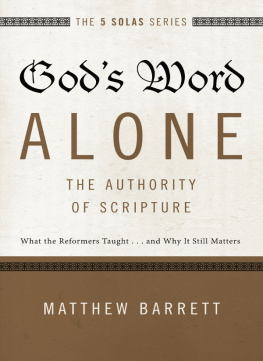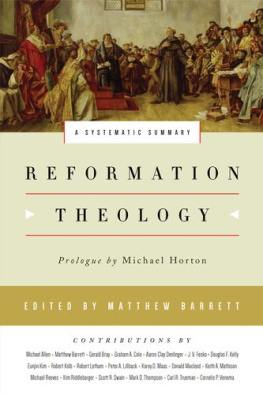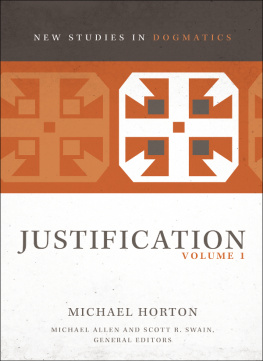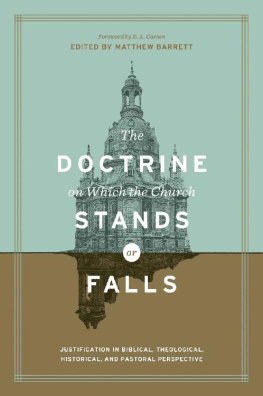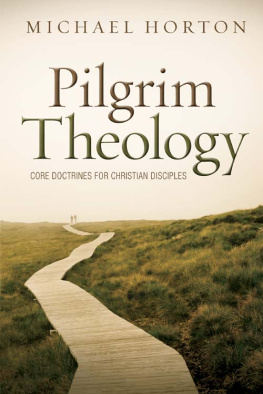Thank you for downloading this Crossway book.
Sign-up for the Crossway Newsletter for updates on special offers, new resources, and exciting global ministry initiatives:
Crossway Newsletter
Or, if you prefer, we would love to connect with you online:
Douglas F. Kelly
Abstract
As we survey the teaching of the major sixteenth - century Reformers on creation, mankind, and the image of God, we find a general unanimity (with only minor differences) among them on Gods creation of humankind, followed by mans fall and the divine restoration. All interpreted the early chapters of Genesis and related New Testament passages (as in Romans 5 and 1 Corinthians 15) in historico - literal fashion that avoided allegorism. For the most part, the Reformers were in line with the great Western theological tradition on mans creation, fall, and redemptionespecially with Augustine (though they criticized him in places). Usually, they were not very far from Peter Lombard and Thomas Aquinas, althoughunlike Thomasthey saw no difference between image and likeness and took more seriously the effects of the fall on the human mind. Most of the Protestant Reformers based their doctrine on serious exegetical work and took advantage of many of the linguistic advances provided by the Renaissance. These sixteenth - century theologians laid a firm intellectual foundation for all later interpretation of Holy Scripture on the question of Psalm 8: What is man?
Introduction
The foundational doctrine of Scripture is the creation of all things out of nothing by the living God. The Bible begins not with an argument for Gods existence but with his creation of the universe. Genesis 1:1 says, In the beginning, God created the heavens and the earth. Creation of all things by God is assumed as the basis of all reality, and frequently celebrated by the Law, the Prophets, and the Wisdom Literature.
Creation is as foundational to the New Testament as it is to the Old. In the New Testament, the prologue to Johns Gospel states, In the beginning was the Word, and the Word was with God, and the Word was God. He was in the beginning with God. All things were made through him, and without him was not any thing made that was made (John 1:13). According to Hebrews 11:3, By faith we understand that the universe was created by the word of God, so that what is seen was not made out of things that are visible.
The books of the New Testament rely heavily on the Genesis account of both creation and the early history of the human race. It has been pointed out that some 165 passages in Genesis are either directly quoted or definitely alluded to in the New Testament.
Scripture and the Reformers Theology Hold Together Creation and Redemption
The Bible is rightly called the book of redemption, and the context of redemption is Gods creation of the cosmos as pure and perfect. By the third chapter of Genesis, the fall of mankind and the rest of the universe (which Adam represented) had occurred. Creation and fall demonstrated the origin of evil and the need for God to redeem mankind and the cosmos out of that destructive evil. The Creator God becomes the Redeemer of his own well - loved handiwork that had fallen into sin, which had then brought guilt, judgment, decay, and death. The first promise of the gospel is found in Genesis 3:15, when the Lord promises our first mother, Eve, that a descendant of hers will reverse the effects of the fall, at immense cost to himself and loss to the Evil One, thereby winning the victory over sin, death, and final judgment.
The gospel can never be understood apart from this creational context, followed by the fall and then the long development of the various phases of the overarching redemptive covenant of grace, which vouchsafes full and final redemption by the same God who created it all to begin with! As
The General Approach of the Reformers
Calvin tied together creation, fall, and redemption in the opening argument of his Commentary on Genesis :
And, in fact, though Moses begins, in this Book, with the Creation of the World, he nevertheless does not confine us to this subject. For these things ought to be connected together; that the world was founded by God, and that man, after he had been endued with the light of intelligence, and adorned with so many privileges, fell by his own fault, and was thus deprived of all the benefits he had obtained; afterwards, by the compassion of God, he was restored to the life he had forfeited, and this through the loving - kindness of Christ; so that there should always be some assembly on earth, which being adopted into the hope of the celestial life, might in this confidence worship God. The end to which the whole scope of the history tends is to this point, that the human race has been preserved by God in such a manner as to manifest his special care for his Church. For this is the argument of the Book.
And in doing so, he and his friend Calvin were not far from parts of Saint Augustines City of God (although they critiqued some aspects of his teaching).
Creation and the Attributes of God
The sixteenth - century Protestant Reformers generally followed in the train of many church fathers and several of the medieval scholastics (with some critique of both) in emphasizing the original Elohim alone is eternal and infinite, dependent on nothing outside himself.
In other words, they saw that Gods eternal self - existence (traditionally called aseity i.e., who exists in and by himself, without dependence on anything outside his own being) is demonstrated (1) in the work of creation, and (2) in the names he is given in the books of Moses, especially those that relate the work of creation.
(1) Creation out of Nothing Demonstrates Gods Self - Existence
In his Sermons on Genesis Chapters 111 , Calvin summarized this point in simpler terms to his congregation in Geneva:
That is why Moses says God created the heaven and the earth. Now, when he uses the word create, he indicates there is no being unless it exists in God alone.... This word create tells us that existence resides only in him. For everything which had a beginning is not of itself, that is, it has nothing proper to itself but derives its being from something else.
(2) Gods Self - Existence Suggested by His Names
The various names ascribed to God in Genesis and Exodus
Bullinger discussed this name similarly:
Among all the names of God that is the most excellent which they call Tetragrammaton , that is (if we may so say), the four - lettered name: for it is compounded of the four spiritual letters, and is called J ehovah . It is derived of the verb -substantive, Hovah , before which they put Jod , and make it Jehovah, that is to say, Being, or I am, as he that is autousia , a being of himself; lacking nobodys aid to make him to be, but giving to be unto all manner of things; to wit, eternal God, without beginning and ending, in whom we live, we move, and have our being. To this do those words especially belong.... And God said to Moses, I am that I am; or, I will be that I will be.... That is, I am God that will be, and he hath sent me who is himself Being, or Essence, and God everlasting.
Or as The meaning of the divine names indicates this essential quality of the living God: aseity. God alone is God; he alone possesses the attributes of eternity and self -existence, of omnipotent and omniscient power. These attributes are never to be ascribed to what he created by that transcendent power.
Next page

